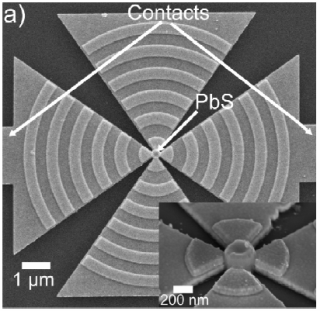Jan 21 2015
High-sensitivity photodetection is at the heart of many optoelectronic applications, including spectroscopy, imaging, surveillance, remote sensing and medical diagnostics. Achieving the highest possible sensitivity for a given photodetector technology requires the development of ultra-small-footprint detectors, as the noise sources scale with the volume of the semiconductor. This must be accomplished without sacrificing neither the optically active area of the detector nor its responsivity.
 An SEM image of the nanoscale QD detector (center) integrated with the bull’s eye plasmonic nanofocusing structure.
An SEM image of the nanoscale QD detector (center) integrated with the bull’s eye plasmonic nanofocusing structure.
Up to now, such designs have been based on diffraction-limited approaches using optical lenses. Now, researchers from the Solution-processed nanophotonic devices group led by ICFO Prof Gerasimos Konstantatos, have employed a plasmonic flat-lens bull’s eye structure (BES) to concentrate and focus light into a nanoscale colloidal quantum dot (CQD) photodetector. The work was published in the new Nature family journal Light: Science & Applications.
In this study, Silke Diedenhofen et al. developed plasmonic lenses to function as nanofocusing resonant structures that simultaneously offer color selectivity and enhanced sensitivity. The researchers have been able to demonstrate the first CQD photodetector with a nanoscale footprint, the optically active area and spectral response of which is determined by the BES. The successful development of this detector represents an exciting opportunity for high-sensitivity sensing.